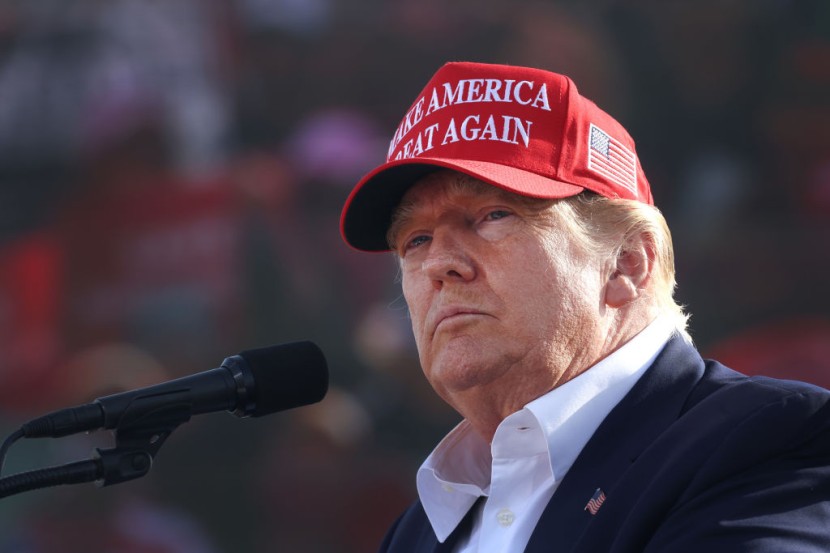
According to a legal document that was published on Friday, federal agents were able to get a search warrant for the former president Donald Trump's Mar-a-Lago estate earlier this month by citing a pile of highly sensitive information they had previously received from it.
Records taken by the FBI from Trump's Florida property before the search on August 8 had marks indicating high sensitivity, human source intelligence, intercepts under the Foreign Intelligence Surveillance Act, and signals intelligence.
Redacted Trump Mar-A-Lago Search Affidavit
Trump's "handwritten annotations" were found in several of those closely guarded documents, according to the partially redacted affidavit outlining the Justice Department probe, Politico reported.
Agents discovered 184 distinct papers in those boxes, 25 of which were classified as "top secret," 92 as "secret," and 67 as "confidential," the lowest level of national security classification. Some of the "highly classified materials were unfoldered, combined with other records, and otherwise unproperly [sic] recognized," NARA employees discovered, according to the affidavit.
In a separate court document that was unsealed on Friday, the prosecution added that "a significant number of civilian witnesses" had been involved in the ongoing criminal investigation into government records hidden at Trump's Florida home, and that their safety might be in danger if their identities were made public.
After more than a year of attempting various, far less intrusive methods to safeguard the papers or get them back, the FBI finally stormed into Trump's Florida mansion and country club on August 8 and hauled out several boxes of sensitive documents.
The National Archives and the Justice Department clearly worked to try to resolve the situation without taking a step as confrontational as requesting and carrying out a court-ordered search warrant, as evidenced by the redacted affidavit that was made public on Friday and earlier disclosures about the course of the effort to identify and recover any official materials Trump improperly retained after leaving the White House.
Missing item listings were given by archivists. Lawyers engaged in talks and letter exchanges. In June, a group of Justice Department representatives visited Mar-a-Lago. There, Trump gave them a short greeting. Only when authorities began to suspect that Trump and his team were not being completely honest did the Justice Department decide to take action this summer, as per NY Times.
The National Archives requested the "immediate assistance" of a group of lawyers who had represented Trump in an email sent in May 2021 to retrieve more than two dozen boxes of the former president's records, including some of his correspondence with Kim Jong Un of North Korea and a letter that President Barack Obama had left for Trump on his first day in office.
Agents Discovered Extremely Sensitive Material
Although Trump's senior White House lawyer had ruled that the records should have been given over, the chief legal at the archives, Gary Stern, claimed in the email that his agency had never received them.
Agents who examined the boxes discovered distinctive marks that may have indicated they contained extremely sensitive human source material or electronic "signals" gathering that was permitted by a judge under the Foreign Intelligence Surveillance Act.
The affidavit mentions a number of marks, including ORCON, or "Originator Controlled," which denotes that the intelligence agency personnel who were in charge of the report did not want it transmitted to other agencies without their consent.
Other kinds of records could still still have secret names or codewords redacted. According to the affidavit, which quotes a letter from the Archives, some of those classified data were mixed in with ordinary paperwork.
The boxes contained "newspapers, magazines, printed news articles, photos, miscellaneous print-outs, notes, presidential correspondence, personal and post-presidential records, and 'a lot of classified records,'" according to the director of the Archives' White House liaison division. Several of the boxes appeared to contain Trump's handwritten notes.
According to David Priess, a former CIA officer and White House briefer who produced 'The President's Book of Secrets,' a history of the President's Daily Brief, "it's never a breaking or critically urgent topic." But he said that keeping it and mixing it with other papers would be "unusual, if not unprecedented," for a president. The affidavit demonstrates once further that Trump was given several chances to surrender the materials to the authorities but choose not to.
Since Trump left the White House, a drawn-out procedure has been in place to recover the records. According to the paper, the Archives requested the missing data on or around May 6, 2021, and "continued to make requests until roughly late December 2021," when it learned that 12 boxes had been located and were available for collection from the club.
Per Telegraph via MSN, Trump has always argued that he fully cooperated with federal officials and had every right to have the documents on the scene, despite abundant evidence to the contrary. In response to the unsealing, he continued to criticize the law enforcement on his social media platform.
Related Article : Donald Trump Home Raid: Here's the Deadline for the Release of Mar-a-Lago Search Warrant Affidavit
@YouTube








